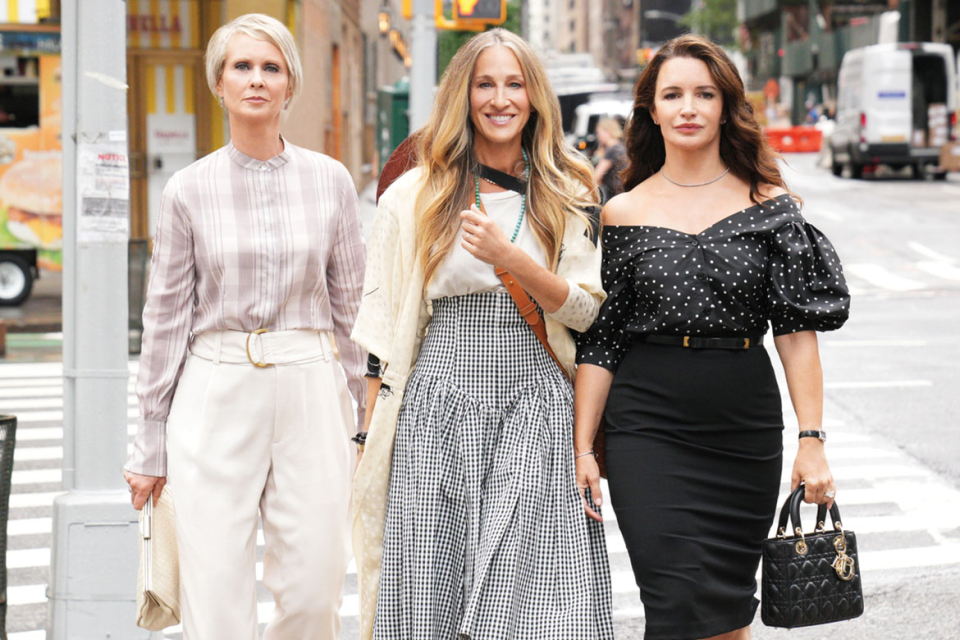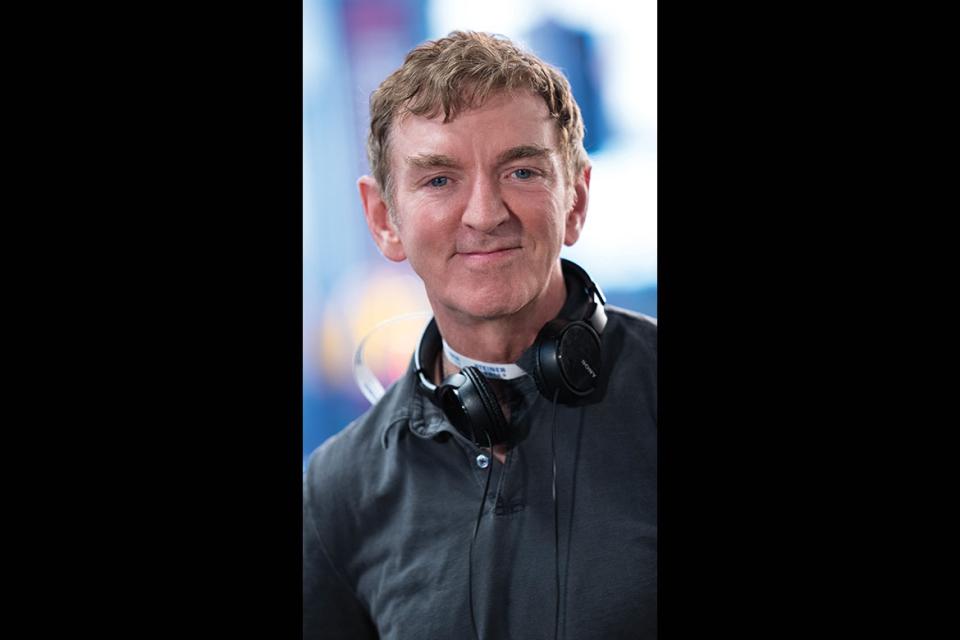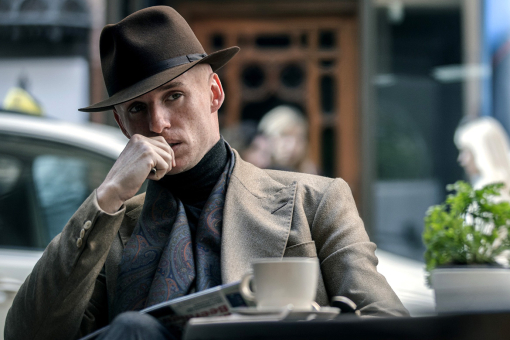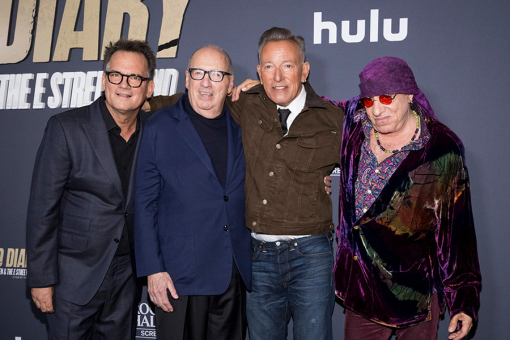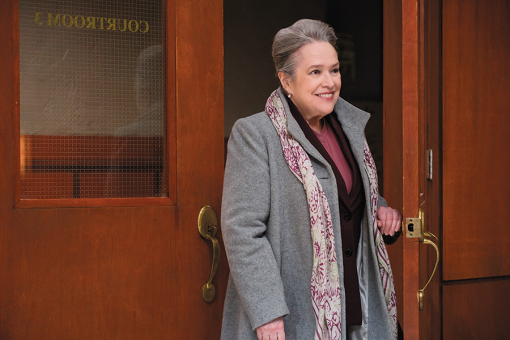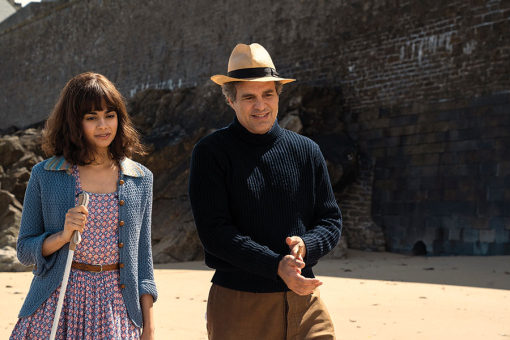And just like that... they're back. Back in a world we knew and loved. A world where a freelance writer dashed from her Upper East Side digs to Manhattan's hottest spots — in designer heels, of course — and where romance was, if not immediate, at least imminent. A world where, no matter how many times hearts shattered, love ruled.
But the love that outlasted the many men seen in HBO's Sex and the City (1998–2004) was that of thirty-something columnist Carrie Bradshaw and her three best pals: Charlotte York-Goldenblatt, Miranda Hobbes and Samantha Jones. As played, respectively, by Sarah Jessica Parker, Kristin Davis, Cynthia Nixon and Kim Cattrall, they were such complicated, fully drawn characters, it's always been fun to imagine where they'd be now.
Sure, we had reprises in two feature films, the first released in 2008 and the second in 2010; a third, rumored to have been greenlit in 2016, was canceled.
But no matter. Because the women are returning in a ten-episode series, titled And Just Like That... and dropping December 9 on HBO Max. Not Cattrall, though. She declined to participate and has said that when she turned sixty, she needed to move on. But Parker, Davis and Nixon have signed on, and as fifty-somethings, they find themselves in an expanded universe with diverse friends.
Details about the show remained under wraps as of press time. But Michael Patrick King — an executive producer, writer and director of the original and the upcoming series — broke from his work on episode eight to reflect on what's being called a new chapter. From his office at Steiner Studios in Brooklyn — two floors above Carrie Bradshaw's "apartment" — he chatted with emmy contributor Jacqueline Cutler about how he took And Just Like That... from a pitch to air in less than a year. Their conversation has been edited for length and clarity.
How did this come about?
Sarah Jessica and I had talked about doing a podcast about the show. We went down that road for a while because we still have a lot to say about it. Then all of a sudden, I thought, "Why are we talking about the past? Why don't we do something in the present?" And pretty quickly, we decided we wanted to do it. We went to HBO, and I pitched that arc of ten episodes. I had already known what I wanted to do, why it would be different, and how it wouldn't be a reboot because nobody was interested in a reboot.
Since it takes place today, do you deal with the pandemic?
We started production in May, the week they said you didn't have to wear masks outside. It was like V-J Day in Times Square. People were throwing their masks up in the air instead of sailor hats.
New York felt vibrant and really alive. That energy is in the show, which takes place right before the Delta variant. We are not dealing with the actual pandemic. There's no mask anywhere on the show. But Covid existed, and it informed lives and changed the way people think. It's in the rear view, but not so far in the rear that there aren't comments like, Do we hug or bump elbows?
Why such secrecy surrounding the show?
It's important! A lot of great storytelling is what's on the next page that you haven't read yet. I'm not somebody who goes to the last page of a book. And I'm not somebody who wants to know what's in my Christmas present. So there's a certain amount of adventure in delaying the obvious as much as possible. There's so much we're doing, it's not just one thing — there are so many things that are fresh and surprising. Of course, two minutes after the show has dropped, it'll all be out.
How is this show different without Samantha?
What you know is that Kim Cattrall is not in it. You don't know this: that Samantha is not.
Why do you think people are clamoring for storylines, feeding the rumor mill?
People have connected to these characters, so it's almost cosplay — it's what they want to have happen. So it's very interactive. It's not just like us keeping a secret. People have projected what they think we're doing and what they want to have happen and what they don't want to have happen.
A few leaked photos caused a stir and revealed that Carrie never lost her love of fashion.
Now that fans have seen the clothes, the surprise will be what people are feeling in the clothes and what they're doing in the clothes.
Let's discuss the new characters. Do they make the women's world more diverse?
The diversity started in the writing room. I've worked with Julie Rottenberg and Elisa Zuritsky before; they worked on [Sex and the City] with me. And then I have Samantha Irby, whose brilliant memoir was a New York Times bestseller. Then Keli Goff, who is a brilliant pundit for NPR and a playwright for the Public Theater. And Rachna Fruchbom [Fresh Off the Boat], who's South Asian; Keli's Black and Samantha's Black.
It wasn't about just their race, though, but their worldview; they all have completely different worldviews. The first thing we wanted to do was make sure that the city was represented, and not only the city but different types of women, and even a different type, gender-wise.
Who is introduced?
Sara Ramirez is playing a gender-neutral, bisexual character, which is very much where I think the world is right now in terms of sexuality, the exploration of that. I talked to Sara a great deal about playing Che Diaz, who is a stand-up comic and runs a podcast that Carrie is on.
Then we have Karen Pittman, an amazing actress playing Nya Wallace, a Columbia Law professor; Miranda is back at Columbia getting her master's in human rights, having left corporate law because of where the world is.
And then there is Nicole Ari Parker, who's playing Lisa Todd Wexley — she's a phenomenon. She's on the Park Avenue school board, but she's also a documentarian and a humanitarian and on the Vogue best-dressed list.
Then there's Sarita Choudhury, who is playing Seema Patel, a powerful realtor, in her fifties, never married — a very important character. So, two of the characters are traditionally married, one has never been married, and one is breaking new rules when it comes to types and how people see gender.
That's quite an expansion from single, white cisgender women looking for men. What conversations led to this?
When we talked about it in the beginning, Sarah Jessica and I wanted these to be real people, not just, "Oh, look who they brought on the show." They all have lives. We took this idea and tried to manifest it, and these new people are joining a train that is moving really fast. People know Miranda, Carrie and Charlotte and they love them. But as we bring in new characters, there are interesting balances, like someone you know very well and someone you're just meeting.
What had to change between who the women were in the original series and who they are now?
The power of the brand is that viewers are interested in where they are now — the work's already done. It's not like you're saying, "Hey, meet these four new characters and become attached to them." The interesting thing is, I don't think anybody's ever played a character from thirty-three to fifty-five in television — the same actor. It's been really wonderful seeing where the characters' marriages are, where their lives are and how they've been affected by the past ten years. It feels familiar yet different; nothing about it is frozen. They're familiar, but they've moved on.
As they evolved, what did you discover?
I think, at a certain point, you know who you are. You continue to move through life based on what's happening to you, but you still have this root [knowledge] of who you are. And Carrie knows who she is now. The fun thing about the series was, she had an impulse about who she was and an impulse about who she belonged with. And it proved true. He [Mr. Big, played by Chris Noth] said, 'You're the one.' It took her a while.
So, to play with these characters now — having them know who they are, but seeing how much they're willing to change based on what life is presenting them — is very, very exciting. And it's exciting for me to add characters that you don't know. It's a very creative process, and what I've learned in this incarnation is: there are a lot of stories, and there's a lot of life, big and small. And we never got to do the third movie.
The original series captured the zeitgeist and influenced fashion, cocktails and conversations. What type of impact do you see for And Just Like That...?
There's this revisionist history of the show that they just wore great shoes and drank cosmos. In reality, it was a very complicated tapestry. Carrie had an affair with a married man when your heroes weren't necessarily allowed to be flawed in a comedy. In a tragedy? Yes, but never in a comedy. Miranda considered abortion. Samantha had cancer. Charlotte's husband had erectile dysfunction for years.
The fact is, the stories have always been complicated and kind of shocking, and I think we're continuing that. But the other thing we're saying is, "Redefine fifty-five. Redefine you. This is what you are, but you can be this; you can be that."
And when we film on the streets, it's so interesting. The word gets out where we are, and, inevitably, at the end of the night, there'll be forty girls there who are twenty-nine, waiting to see Sarah Jessica and the other ladies. But they're twenty-nine!
Are we looking at another multi-year series?
I don't know. As we were working, it always felt like the beginning. It didn't feel like a beginning, middle and an end. So I think it's possible to keep going — if we have enough good stories. The real reason I wanted to do this again is because I felt strongly that there was a new story to tell. It wasn't just to try to recapture something, because that, to me, is foolish. It's already there. The bottom line is, it's thrilling, it's daunting. It's creatively a risk, and that's exciting to me — to be taking a risk again, with these characters I love so much.
This article originally appeared in emmy magazine, Issue No. 12, 2021

